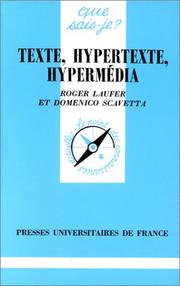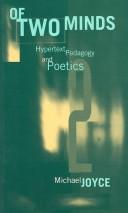| Listing 1 - 10 of 112 | << page >> |
Sort by
|
Book
ISBN: 1783083441 0857281968 0857280791 Year: 2013 Publisher: London : Anthem Press,
Abstract | Keywords | Export | Availability | Bookmark
 Loading...
Loading...Choose an application
- Reference Manager
- EndNote
- RefWorks (Direct export to RefWorks)
This book explores the history of hypertext, an influential concept that forms the underlying structure of the World Wide Web and innumerable software applications. Barnet tells both the human and the technological story by weaving together contemporary literature and her exclusive interviews with those at the forefront of hypertext innovation, tracing its evolutionary roots back to the analogue machine imagined by Vannevar Bush in 1945.
Hypertext systems --- History. --- Web sites --- Design.
Periodical
Year: 1997 Publisher: Southampton, U.K. : Multimedia Research Group, University of Southampton,
Abstract | Keywords | Export | Availability | Bookmark
 Loading...
Loading...Choose an application
- Reference Manager
- EndNote
- RefWorks (Direct export to RefWorks)
The Journal of Digital Information, JoDI, is an electronic journal only (no paper equivalent) for people who work in the digital information field.
Electronic information resources --- Database management --- Hypertext systems --- Digital libraries --- Metadata --- Information Dissemination. --- Information Systems. --- Database management. --- Digital libraries. --- Electronic information resources. --- Hypertext systems. --- Metadata.
Periodical
Year: 1996 Publisher: [Troy, NY] : D'artagnan Communications Group,
Abstract | Keywords | Export | Availability | Bookmark
 Loading...
Loading...Choose an application
- Reference Manager
- EndNote
- RefWorks (Direct export to RefWorks)
Designed to serve as a peer-reviewed resource for teachers, researchers, and tutors of writing, including such areas as composition studies, rhetoric, technical and professional writing, creative writing, and literary studies.
English language --- Hypertext systems --- Hypertext systems. --- Internetliteratur. --- Zeitschrift. --- Online-Publikation. --- Study and teaching --- Computer-assisted instruction --- Composition and exercises --- Composition and exercises. --- Computer-assisted instruction. --- Study and teaching.
Book
ISSN: 02212579 ISBN: 2110035056 Year: 1996 Publisher: Paris : La Documentation Française,
Abstract | Keywords | Export | Availability | Bookmark
 Loading...
Loading...Choose an application
- Reference Manager
- EndNote
- RefWorks (Direct export to RefWorks)
Multimedia systems --- Hypertext systems --- Multimédia --- Hypertexte --- Interaction homme-ordinateur --- Multimédias interactifs --- Métaphore --- Multimédia
Book
ISBN: 2020130912 9782020130912 Year: 1993 Volume: 90 Publisher: Paris: La Découverte,
Abstract | Keywords | Export | Availability | Bookmark
 Loading...
Loading...Choose an application
- Reference Manager
- EndNote
- RefWorks (Direct export to RefWorks)
L'information se manipule, l'expérience se simule, l'intelligence s'artificialise. L'informatique et les réseaux de communication, en permettant à chaque utilisateur d'organiser textes, sons, images ou logiciels en hypertextes divers et fluctuants, suscitent des technologies de l'intelligence aussi radicalement nouvelles que le furent, en leur temps, celles liées à l'écriture. Comment se constitue un hypertexte? Comment fonctionnent ces réseaux qui organisent et redistribuent sans cesse l'information? Comment, surtout, ces technologies intellectuelles modifient-elles nos modes de pensée?
Hypertext systems --- Expert systems (Computer science) --- INFORMATIQUE --- REPRESENTATION DES CONNAISSANCES --- SCIENCES COGNITIVES --- PHILOSOPHIE

ISBN: 2130444296 9782130444299 Year: 1992 Volume: 2629 Publisher: Paris : Presses universitaires de France,
Abstract | Keywords | Export | Availability | Bookmark
 Loading...
Loading...Choose an application
- Reference Manager
- EndNote
- RefWorks (Direct export to RefWorks)
Information systems --- Hypertext systems --- Hypertexte --- Hypermedia systems --- 621.397 --- 654.145 --- AA / International- internationaal --- 654 --- Hypertext --- Interactive multimedia --- Interactive media --- Computer software --- Informatieverwerking. Bureautica. --- Hypermedia systems. --- Hypertext systems. --- Informatieverwerking. Bureautica
Book
ISBN: 0134416430 0134416503 Year: 1993 Publisher: New York, N.Y. Ellis Horwood
Abstract | Keywords | Export | Availability | Bookmark
 Loading...
Loading...Choose an application
- Reference Manager
- EndNote
- RefWorks (Direct export to RefWorks)
Information systems --- Hypertext systems --- Hypertexte --- Psychological aspects --- Aspect psychologique --- -#SBIB:309H1720 --- Hypertext --- Interactive multimedia --- Informatiekunde, informatie management --- #SBIB:309H1720
Book
ISBN: 9780415352307 9780203698914 Year: 2014 Publisher: London ; New York : Routledge,
Abstract | Keywords | Export | Availability | Bookmark
 Loading...
Loading...Choose an application
- Reference Manager
- EndNote
- RefWorks (Direct export to RefWorks)
Digital Literary Studies presents a broad and varied picture of the promise and potential of methods and approaches that are crucially dependent upon the digital nature of the literary texts it studies and the texts and collections of texts with which they are compared. It focuses on style, diction, characterization, and interpretation of single works and across larger groups of texts, using both huge natural language corpora and smaller, more specialized collections of texts created for specific tasks, and applies statistical techniques used in the narrower confines of authorship attribution to broader stylistic questions. It addresses important issues in each of the three major literary genres, and intentionally applies different techniques and concepts to poetry, prose, and drama. It aims to present a provocative and suggestive sample intended to encourage the application of these and other methods to literary studies.
Literature and the Internet. --- Discourse analysis, Literary --- Literature --- Electronic publications. --- Digital libraries. --- Hypertext systems. --- Linguistics. --- Language and languages --- Style.

ISBN: 0472065785 0472095781 Year: 1995 Publisher: Ann Arbor, Mich. University of Michigan Press
Abstract | Keywords | Export | Availability | Bookmark
 Loading...
Loading...Choose an application
- Reference Manager
- EndNote
- RefWorks (Direct export to RefWorks)
Hypermedia systems --- Hypertext systems --- Literature --- -Literature and technology --- Poetics --- Poetry --- Industry and literature --- Technology and literature --- Technology --- Belles-lettres --- Western literature (Western countries) --- World literature --- Philology --- Authors --- Authorship --- Hypertext --- Interactive multimedia --- Interactive media --- Computer software --- Study and teaching --- Technique --- Hypertext systems. --- Thematology --- Information systems --- Interactive multimedia. --- Literature and technology. --- Poetics. --- Lerarenopleiding --- Study and teaching. --- (vak)didactiek talen. --- HYPERTEXT SYSTEMS --- LITERATURE --- POETICS --- STUDY AND TEACHING
Book
ISBN: 9780874217490 Year: 2009 Publisher: Utah State University Press/ Computers and Composition Digital Press
Abstract | Keywords | Export | Availability | Bookmark
 Loading...
Loading...Choose an application
- Reference Manager
- EndNote
- RefWorks (Direct export to RefWorks)
Together, computerized writing environments (e.g., physical spaces, hardware, software, and networks) and the humans who use and support such technologies comprise complex ecologies of interaction. As with any ecology, a human-computer techno-ecological system needs to be planned, fostered, designed, sustained, and assessed to create a vibrant culture of support at the individual, programmatic, institutional, and even national and international level. Local and larger infrastructures of composing are critical to digital writing practices and processes. In academia, specifically, all writing is increasingly computer-mediated; all writing is digital. Unfortunately, at far too many institutions, it is difficult to sustain ecologies of digital writing. How then to best plan, foster, design, sustain, and assess the complex ecologies framing the study and practice of digital writing that we do (or hope to do) as teachers, scholars, learners, and writers? The audience for this collection is teachers, scholars, administrators, and graduate students working in fields of composition studies, computers and writing, technical/professional communication, literature, education, and English education. We all face the same dilemma: More and more of our work and instruction takes place in electronic environments, but budget constraints and assessment mandates loom, and often our positions within or institutions prohibit us from active participation in central computing endeavours. This necessarily multivocal collection refines our discussions of the many components of sustainability, providing contextual, situated, and flexible modes and methods for theorizing, building, assessing, and sustaining digital writing ecologies.
English language --- Report writing --- Electronic portfolios in education --- Hypertext systems --- English --- Languages & Literatures --- English Language --- Rhetoric --- Computer-assisted instruction --- Study and teaching --- ePortfolios in education --- Portfolios in education --- Hypertext --- Interactive multimedia --- Germanic languages --- English language -- Rhetoric -- Computer-assisted instruction. English language -- Rhetoric -- Study and teaching. Report writing -- Study and teaching. Electronic portfolios in education. Hypertext systems. --- Electronic portfolios in education. --- Hypertext systems. --- Computer-assisted instruction. --- Rhetoric. --- Study and teaching.
| Listing 1 - 10 of 112 | << page >> |
Sort by
|

 Search
Search Feedback
Feedback About UniCat
About UniCat  Help
Help News
News